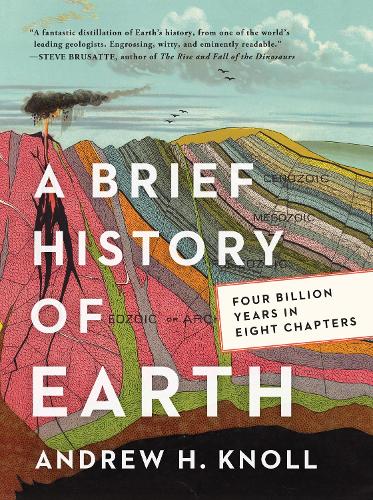
A Brief History of Earth: Four Billion Years in Eight Chapters
(Hardback)
Available Formats
Hardback
Published: 28th July 2021
Paperback
Published: 20th September 2023
Paperback
Published: 28th July 2021
Publishing Details
A Brief History of Earth: Four Billion Years in Eight Chapters
By (Author) Andrew H. Knoll
HarperCollins Publishers Inc
HarperCollins
28th July 2021
United States
Classifications
General
Non Fiction
Geology, geomorphology and the lithosphere
Applied ecology
History of science
525
Physical Properties
Hardback
272
Width 140mm, Height 184mm
340g
Description
Harvards acclaimed geologist charts Earths history in accessible style(AP)
A sublime chronicle of our planet."Booklist,STARRED review
How well do you know the ground beneath your feet
Odds are, where youre standing was once cooking under a roiling sea of lava, crushed by a towering sheet of ice, rocked by a nearby meteor strike, or perhaps choked by poison gases, drowned beneath ocean, perched atop a mountain range, or roamed by fearsome monsters. Probably most or even all of the above.
The story of our home planet and the organisms spread across its surface is far more spectacular than any Hollywood blockbuster, filled with enough plot twists to rival a bestselling thriller. But only recently have we begun to piece together the whole mystery into a coherent narrative. Drawing on his decades of field research and up-to-the-minute understanding of the latest science, renowned geologist Andrew H. Knoll delivers a rigorous yet accessible biography of Earth, charting our home planet's epic 4.6 billion-year story. Placing twenty first-century climate change in deep context, A Brief History of Earth is an indispensable look at where weve been and where were going.
Features original illustrations depicting Earth history and nearly 50 figures (maps, tables, photographs, graphs).
Reviews
A fantastic distillation of Earth's history, from one of the worlds leading geologists: Andrew H. Knoll has written an engrossing, witty, and eminently readable rompthrough our home planets 4.5billion years, from trilobites and dinosaurs to human origins and our rapidly changing modern times. Steve Brusatte, New York Times bestselling author of The Rise and Fall of the Dinosaurs "Having spent decades at the forefront of discovery and research, Andrew H. Knoll has been one of our planet's leading scientists. In A Brief History of Earth, Knoll treats us to a 4.6-billion-year detective story revealing the origins and inner workings of our home in the solar system. In these pages you'll discover something profound: how our past, present, and future are grounded in Planet Earth." Neil Shubin, author of Your Inner Fishand Some Assembly Required "Covers the arc of our planets history from its earliest formation to the present day in a succinct and deftly-written way." Forbes Charts the planets history in accessible style, from its beginning as a small planet accreted out of rocky debris circling a modest young star through the development of minerals, geographical formations, atmosphere, and life forms large and small. Associated Press "Skillfully condenses the history of the Earth. ...An expert primer on the history of everything." Kirkus Reviews "Asublime chronicle of our planets formation and beginnings, the perhaps unlikely yet awe-inspiring interactions that created life, diverse and abundant, and mass extinctions and recoveries. Knoll skillfully presents the extreme conditions, violence, and delicate fragility that mark the cycles and evolution of our home." Booklist (starred review) "The type of book that is sorely neededat this moment in history. ... Knoll assembles facts from a wide variety of fields to tell our planets story in a clear and accessible narrative." Scientific Inquirer An eloquent call to action. CNN.com "In spite of its sweeping scale, the Harvard geologist and natural history professors primer not only makes the titular four billion years understandable his accessible expertise makes it interesting." Globe and Mail (Toronto)
Author Bio
Andrew Knoll is the Fisher Professor of Natural History at Harvard University. He has been a member of the Harvard faculty since 1982, serving as both Professor of Biology and Professor of Earth and Planetary Sciences. Professor Knoll's research focuses on the early evolution of life, Earth's environmental history, and, especially, the interconnections between the two. He has conducted field research on five continents and for two decades served on the science team for NASA's MER mission to Mars. Professor Knoll's honors include the International Prize for Biology, the Walcott Medal and the Mary Clark Thompson Medal of the National Academy of Sciences, the Oparin Medal of the International Society for the Study of the Origins of Life, the Moore Medal of the Society for Sedimentary Geology, the Paleontological Society Medal, and the Wollaston Medal of the Geological Society of London. Knoll is a member of the National Academy of Sciences, the American Academy of Arts and Sciences, and the American Philosophical Society, and is a foreign member of the Royal Society of London. His first book, Life on a Young Planet (Princeton University Press) received the Phi Beta Kappa Book Award in Science.
